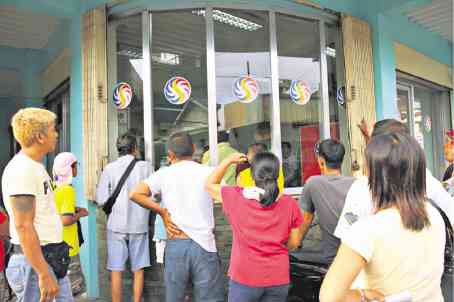Duterte’s next target: Illegal gambling
President Rodrigo Duterte’s Task Force on Illegal Gambling is taking center stage in his war on crime this month, with sweeping changes in the state-run Small Town Lottery (STL), which he hopes will finally slay “jueteng,” “masiao,” two-ball and other illegal numbers games in the country.
Justice Secretary Vitaliano Aguirre II is head of the task force along with Executive Secretary Salvador Medialdea and Finance Secretary Carlos Dominguez, whose main goal is to shake down the gaming industry of illegal operators and generate massive funds for the President’s social projects.
Aguirre said illegal gambling would be the third front in the President’s all-out war against crime after starting with illegal drugs and moving on to corruption.
“After drugs and corruption, I was instructed by the President to investigate illegal gambling, small town lottery and online gambling. I’m just waiting for the EO (executive order),” Aguirre said.
Illegal gambling was one of the main topics in last Monday’s Cabinet meeting, where the President expressed his plan to provide free medicine to indigent Filipinos by generating billions of pesos in tax revenues by coming down hard on proprietors of illegal numbers games, he said.
Article continues after this advertisementAguirre said that the task force was almost finished with its reforms in STL, while the executive order would lay down the powers and areas to be covered by the task force in going after illegal online gaming operators.
Article continues after this advertisementAguirre said the President’s main concern was how jueteng and masiao operators were able to coopt the STL operations of the Philippine Charity Sweepstakes Office (PCSO), which was launched in the Arroyo administration specifically to legalize these numbers games.
“It was supposed to kill jueteng but it has only been remitting 10 to 15 percent of what the President believes should go to the government,” Aguirre said.
“What the President wants is for the PCSO to collect everything that it should be earning. That is where he will get the money to give free medicine to Filipinos,” he said.
Aguirre said the President’s main targets were jueteng lords and masiao operators who continued to thrive despite efforts to stop their illegal operations in the last few administrations.
A National Bureau of Investigation report released in 2015 revealed that STL operators have defrauded PCSO of at least P50 billion a year by underdeclaring their sales reports that served as the basis for the government’s share.
The PCSO reported only P4.7 billion in revenues from STL in 2015.
The new PCSO board, led by former police Director Jose Jorge Corpuz as chair and former Marine Major Gen. Alexander Balutan as general manager, questioned why the previous management had limited the number of STL operators to only 18 since it was launched in 2006.
As part of reforms to make STL live up to its original purpose as a “jueteng killer,” PCSO has expanded the list of STL operators to bring in more competition. It has also toughened up on the collection of the government’s share and cracked down on the bribery of police and local government protectors.
Aguirre said over 200 made a bid for the STL franchises and he expected the PCSO to announce the new and expanded list of operators by the end of January. He did not say how many franchises would be allowed to operate nationwide.
He said even alleged jueteng lord Charlie “Atong” Ang was forced to bid for the STL franchises as he has been operating jai alai inside the Cagayan Freeport and its subsidiary game, Virtual 2 Ball, Meridien Vista Gaming Corp.
“He (Ang) has to stop Meridien because he has to apply for an STL franchise. He doesn’t pay taxes unlike STL which, although they cheat, at least pay to PCSO,” said Aguirre, who was not sure if Ang won any STL franchise.
Aguirre said the crackdown on STL and illegal numbers games began months before the Department of Justice and NBI busted gaming tycoon Jack Lam’s illegal gambling operations at Fontana Casino in Pampanga and Fort Ilocandia in Ilocos Norte. —WITH A REPORT FROM TARRA QUISMUNDO
